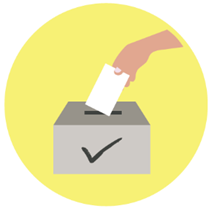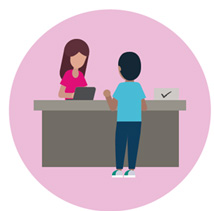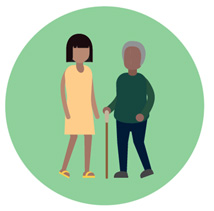How you can get involved in local democracy with Auckland Council

Vote during local government elections
Local government elections are held every three years and we encourage you to learn about the candidates and get out and vote!
Your vote makes sure that the people who best represent your views and voice have a chance of being elected.
Go to the
Electoral Commission to make sure you are enrolled for the next election.
Become an elected member
As part of a democracy, any New Zealand citizen who is enrolled to vote can run for an elected member position.
You don’t need any special qualifications to become a candidate. Elected members come from all backgrounds and walks of life.
A diversity of views and experience from elected members is another key part of a healthy democracy.
For more information, see
Information for candidates.
Make a submission on public consultations

Before making major decisions, Auckland Council usually consults the community so their views can be considered by councillors and local boards.
We often consult on topics that affect the whole region but consultations can also be led by local boards if it's a local matter.
We strongly encourage you give feedback during these consultations.
You can view all of the topics which are open for consultation on the
Have Your Say website.
Have your say
Have Your Say website
Visit
AK Have Your Say to view all open consultations.
Consultations are also advertised on our website, social media pages, and sometimes in the wider media.
Select any consultation you are interested in to view the documents detailing the proposal.
Let us know how you feel about the proposal by sending us some feedback. You can either answer the multiple choice questions in the feedback form online, or write down your feedback and send it via email.
You should include things like:
- What do you agree with?
- What do you disagree with?
- What would you propose instead?
- Why would you propose this?
Join the People’s Panel
The People’s Panel is a great way of putting your hand up to take part in online surveys when we seek feedback from the public.
If you sign up for the People’s Panel, you will receive one or two short surveys each month and you only need to complete the ones which interest you.
After you participate in a survey, you'll receive the results once consultation has closed. This is a great way of knowing more about how your community feels about topics that interest you. All your personal details will remain private throughout the process.
Help shape Auckland – sign up to the
People’s Panel.
Talk to your elected local representatives

If there's an issue that's not currently open for consultation, you can always talk to your elected local representatives.
Local boards are elected to make local decisions for each local board area.
They have local offices that are open to the public.
Bring local issues and concerns directly to your local board by:
- contacting the local board office
- contacting elected local board members
- presenting to a local board meeting.
Auckland’s unique governance structure means that we have both our governing body and local boards. See
our governance model to learn more about what each of these is responsible for.
If you want to discuss Auckland-wide issues, contact a member of the Governing Body.
See how to contact
Ward councillors.
Start a petition
One way of engaging with your local elected representatives is through a petition.
A petition is a request for your elected representatives to investigate an issue that you are concerned about. Individuals or groups can start a petition. Petitions made to the council will be directed to the area of the council that is responsible for that issue.
For example, if you and your neighbours felt that the trees on your street were always overgrown and needed more attention, you could submit a petition that you and your neighbours sign.
This petition would be asking the council to investigate whether tree pruning in your local neighbourhood could happen more often.
Attend public meetings
At Auckland Council, all meetings and committees of the Governing Body and local boards are open to the public.
The Governing Body and local boards make decisions that affect Aucklanders, so we all have a right to know how they are made.
This ensures transparent decision-making which is another very important part of democracy.
How to attend a public meeting
Attend these meetings in person (depending on Covid-19 restrictions), or online if it is being held virtually.
See all
upcoming public meetings and agendas.
If a meeting is held online, then you can view the
live stream.
What to expect at a public meeting
Public meetings are held to discuss topics and issues and make decisions about them.
The topics that are being discussed at each meeting are put together in an ‘agenda’.
The agenda is published two days before each meeting, so you can find out what will be discussed.
See all
upcoming public meetings and agendas.
Speak at public meetings
As a member of the public, you can speak at any public meeting. Up to 30 minutes at the beginning of each meeting are dedicated to hearing from the public.
For Governing Body and committee meetings, you need to contact the Governance Advisor who is running the meeting at least a full working day before the meeting.
Contact details for the Governance Advisor will be in the meeting agenda. Remember to include the subject matter that you are requesting to speak about. You will have up to five minutes to speak.
For local board meetings, you do not need any formal approval to speak. You will have up to three minutes to speak.
After you have spoken in your allocated time, you can listen to the elected members' discussion at the meeting, but you will not be able to participate.
Deputation
You can also choose to make a presentation at your local board meeting through a deputation.
A deputation is a formal presentation, requiring seven days' notice and the chairperson's approval.
Each speaker is allocated 10 minutes for a presentation.
You can talk about issues facing you or your community group or give updates about your group's activities.
A deputation is delivered in a public setting and is recorded on the official minutes.
Find out more about
how to speak at Governing Body and local board meetings.
Request official information
The Local Government Official Information and Requests Act (LGOIMA) was passed in 1987 to ensure that information is available to the public from local government agencies (like the Auckland Council) when requested.
Think of it as a tool for transparency that helps streamline requests for information from Auckland Council.
There is a lot of information that is readily available on the Auckland Council website, but sometimes we do not publish exactly what you are looking for.
Find out more about
requesting information from us.
Explore our archives
There is an
archive of previous meetings, agendas, and recordings.
You can scroll through and check out what was discussed at these meetings, and what decisions were made.
Sign up for learning resources
Register to receive a link to our civics education resources for schools and community groups.
You will receive separate educational resources for four lessons based on the information on this site.
Each lesson takes a closer look at the topic through four fun activities with clear learning objectives that are easily adaptable for any classroom or interest group.
Sign up now 